Spartacus
Spartacus: leader of an army of runaway slaves that shook Italy in 73-71 BCE. He was defeated by the Roman general Crassus.
Italian slavery
The Roman economy was based on agriculture and war. For centuries, a Roman citizen was a peasant and a soldier. During the Second Punic war (218-202; against the Carthaginian general Hannibal), this started to change. The Romans had to fight their wars overseas: in Hispania, and, after 200, Greece and Macedonia. Often, the soldiers had to stay abroad for a long time, and it often happened that on their return, they found that their farms had gone bankrupt. Under these circumstances, there was only one solution: sell the farm and move from the country to the city.
The Italian cities were rapidly growing, and the countryside also changed.Slowly, the small farms were replaced by large plantations (often called latifundia), where the work was done by slaves, who could not be recruited for military service. The Greek historian Appian of Alexandria (c.95-c.165) describes the results:
The rich [...] used persuasion or force to buy or seize property which adjoined their own, or any other smallholdings belonging to poor men, and came to operate great ranches instead of single farms. They employed slave hands and shepherds on these estates to avoid having free men dragged off the land to serve in the army, and they derived great profit from this form of ownership too, as the slaves had many children and no liability to military service and their numbers increased freely. For these reasons the powerful were becoming extremely rich, and the number of slaves in the country was reaching large proportions, while the Italian people were suffering from depopulation and a shortage of men, worn down as they were by poverty and taxes and military service. And if they had any respite from these tribulations, they had no employment, because the land was owned by the rich who used slave farm workers instead of free men.note
In this way, the countryside became crowded with slaves: usually prisoners of war, but often simply bought from slave traders, who bought them from pirates. (A modern estimate: there were two million slaves on an Italian population of six million.) Strong captives were sometimes forced to fight as gladiators in the arena. The ancients really loved this bloody spectacle, something we could expect from the bellicose Romans (although gladiatorial contests were just as popular in the Greek world).
Sources
One of those was Spartacus, the leader of a rebellion of gladiators and slaves that escalated to a full-scale war in the years 73-70. We have two main sources: Plutarch of Chaeronea (46-c.122) describes this war in his Life of Crassus (text), and one generation later, Appian told the story in his History of the Civil wars (text). Both accounts describe more or less the same events in exactly the same sequence, and it is tempting to see the same source behind their stories, probably the Histories of Sallust or (less likely) Livy's History of Rome from its Foundation. It seems that Appian has abridged his account, whereas Plutarch has left out several stories about Spartacus' cruelty.
Revolt
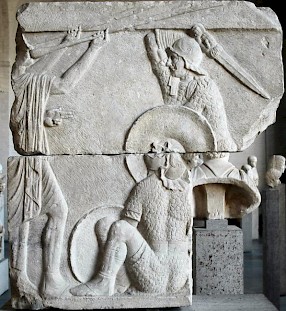
In 73, seventy-eight gladiators managed to escape from the fighting school of Gnaeus Lentulus Batiatus at Capua. According to Plutarch, they were only armed with choppers and spits, which they had found in a kitchen. However, they soon discovered a transport of gladiatorial weapons. From now on, they were heavily armed, and they occupied a mountain.
Appian informs us that this was the Vesuvius, and that the gladiators elected three leaders: Spartacus, Oenomaus and Crixus. Probably, they represented ethnic groups: a Thracian, a Greek, and a German. According to Plutarch,
Spartacus was a Thracian from the nomadic tribes and not only had a great spirit and great physical strength, but was, much more than one would expect from his condition, most intelligent and cultured, being more like a Greek than a Thracian.note
This last remark is a well-known cliché from ancient literature. Any non-Greek/Roman who had done something special, was said to be more intelligent than other barbarians. Other sources say that Spartacus could have so much success because he had once fought in the Roman auxiliaries.
Already at this stage of the revolt, runaway slaves, shepherds, and herdsmen must have joined the band of gladiators (our sources mention this at a later stage). We have to assume this, because otherwise, it is impossible to explain how the gladiators were able to overcome a militia sent by the Capuan authorities to deal with the runaways. The only result was that the gladiators now had real arms. Their numbers quickly swelled, because, as Appian tells us, Spartacus "divided the spoils in equal shares".
Glaber's expedition
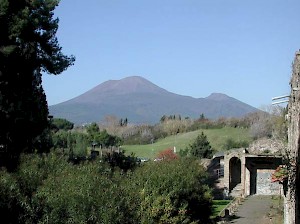
The central government at Rome now had to intervene, and it sent the propraetor Gaius Claudius Glaber with an army of 3,000 hastily conscripted and untrained soldiers. Perhaps this was an underestimation of the power of the gladiators on the Vesuvius, but it is more likely that Rome was unable to send a stronger force. The empire was involved in two large wars: general Pompey was fighting against Sertorius in Hispania and his colleague Lucullus against king Mithridates VI of Pontus in the east. The city itself was restless because, due to these wars, grain had become scarce.
Although he had a small and untrained army, Claudius came close to success. He isolated the gladiators on a hill-top which was covered with vines, and it looked as if they were chanceless. However, the besieged made ladders from the branches of the vines, descended from the hill during the night, and managed to get behind the enemy lines. The Romans panicked and fled, and their camp was looted by the gladiators. They could start to give weapons to the runaway slaves who had joined them.
Varinius' expedition
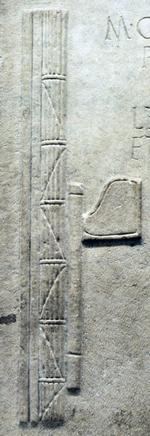
"Rome" launched a second expedition against the gladiators, this time commanded by the praetor Publius Varinius. For reasons that are unknown to us, he divided his forces, and the divisions were easily defeated by the army of the gladiators. Varinius himself was humiliated: he lost the very horse that he rode, his lictors were taken prisoner, and Spartacus paraded their fasces through his camp.
The Roman author Publius Annius Florus, who published an Epitome of the great History of Rome from its Foundation of Livy, mentions that the army of gladiators and slaves "laid waste Nola, Nuceria, Thurii and Metapontum with terrible destruction" (text). These towns are all situated in the southern half of Italy. The shepherds of this region, real cowboys, joined the army of Spartacus. From now on, he could also employ cavalry.
The consular expedition
Next year, the Senate understood that this war was serious. According to Appian, Spartacus now commanded some 70,000 people, and although we do not know how he obtained this figure, we can be sure that the wealthy land-owners in the Senate understood that their slaves could also run away. Therefore, the senators ordered both consuls, Lucius Gellius Publicola and Gnaeus Cornelius Lentulus Clodianus, to proceed against the bands of Spartacus.
According to Appian of Alexandria, Spartacus had used the winter to manufacture weapons. His army must have controlled the countryside of the entire Campania. It was his plan to cross the Apennines and move to the north, where his people could return to their homelands in Gaul, Germania, or the Balkans. It would be difficult to lead 70,000 people out of Italy, and it was necessary to march in separated columns.
This offered an opportunity to the Romans. In the spring of 72, consul Lucius Gellius Publicola unexpectedly attacked a division that is called "the German contingent" by Plutarch of Chaeronea, and "the force of Crixus" by Appian. The latter states that Crixus lost two-thirds of his 3,000 men in a battle, which took place in the neighborhood of modern Foggia. At the same time, consul Gnaeus Cornelius Lentulus Clodianus intercepted the main force of Spartacus' army somewhere in the Apennines. It was his task to wait for his colleague, so that their enemy would be under attack from two sides. But Spartacus defeated both armies separately, took their equipment, and continued his march to the Adriatic Sea.
At this point, there is a remarkable difference between the accounts of Plutarch and Appian. Plutarch tells how Spartacus "pushed on towards the Alps", Appian adds another detail.
In the aftermath the consuls retreated in confusion, while Spartacus, first sacrificing 300 Roman prisoners to Crixus, made for Rome with 120,000 foot soldiers after burning the useless equipment and putting all the prisoners to death and slaughtering the draught animals to free himself of all encumbrances.note
It is likely that Plutarch ignored this cruel story because it did not suit in his description of Spartacus as "intelligent and cultured, being more like a Greek than a Thracian". The story is also told by Publius Annius Florus (and, in a slightly different form, the Christian author Orosius):
He also celebrated the obsequies of his officers who had fallen in battle with funerals like those of Roman generals, and ordered his captives to fight at their pyres, just as though he wished to wipe out all his past dishonor by having become, instead of a gladiator, a giver of gladiatorial shows.note
The two consuls were not defeated yet. They marched their armies back to Rome, briefly pursued by Spartacus, who may have wanted to create panic. But it was not his intention to march on Rome, and he brought his army to the Adriatic, continuing his march to the Alps. The consuls understood what was going on and the legions marched to the Adriatic as well. There were several excellent roads, and they arrived there first. Somewhere south of Ancona, the two armies fought again, and again Spartacus was victorious.
No escape
The gladiators and slaves now could escape, but there was one last obstacle: the army of Gallia Cisalpina, the Roman province along the river Po. At Modena, governor Gaius Cassius Longinus and his provincial army were defeated.
And now, something strange happened. Spartacus had reached his aim: his people could cross the Alps and go back to their homelands in Gaul, Germany, and the Balkans. And yet, this is not what happened. Instead, the enormous army turned south. Plutarch offers a lame excuse:
Spartacus' view was that they should cross the mountains and then disperse to their own homes [...]. His men, however, would not listen to him. They were strong in numbers and full of confidence, and they went about Italy ravaging everything in their way.note
This is not incredible. In this age, the Roman legions were armies of pillager: the Social War, Sulla's first march on Rome, the First Mithridatic War, the first Civil War, and the conflicts after the death of Sulla all had resulted in terrible looting. The slaves simply did what the Romans did. However, it is likely that some refugees did not join this march, and did in fact cross the Alps and return to their homes.
Crassus commander
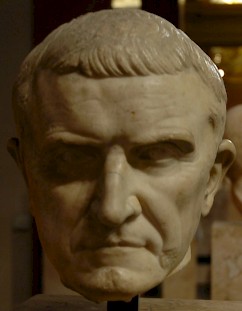
Meanwhile, in Rome, the consuls were told to return to civilian life, and a new commander was chosen for the war: Marcus Licinius Crassus. The remains of two consular legions seem to have remained in the neighborhood of Ancona, and Crassus ordered their commander, Mummius, to join him further to the south. He was not to make contact with the enemy. However, Mummius believed that he saw a good opportunity, offered battle and was defeated. Crassus was angry, and punished the defeated soldiers harshly. They were to be decimated: every tenth soldier was to be killed by his comrades. The result was that the Roman soldiers learned that they had more to fear from their commander than from the runaways, and discipline was restored.
In the winter of 72/71, Spartacus arrived in Bruttium, the "toe" of Italy, and captured Thurii. (It was the only time he settled his people in a town.) This time, his intention was to conquer Sicily. There had been several major rebellions of slaves on the island: between 135 and 132, a Syrian slave named Eunus had ruled as a king, and more recently, in 104, a certain Salvius had been able to do the same, calling himself Tryphon. When he had died, his revolt had been continued by a man named Athenio; it had lasted until 101.
Spartacus may have had the same plan, or an even better one, because he collaborated with the Cilician pirates. To them, a base on Sicily would be a great asset, because the Romans had not much naval experience and the Cilicians could loot and plunder the Italian coast without meeting opposition.
Endgame
But apparently, something went wrong, because the Cilicians did not appear. Who did appear, was Crassus, and he ordered his men to build a large wall across Bruttium, from the Tyrrhenian to the Ionian Sea. It was sixty kilometers long, but his army consisted of eight legions or 32,000 men, and the job was done quickly. Spartacus was trapped.
A first attack of the gladiators was repulsed without difficulty: the Romans lost three men and killed 6,000 enemies (or so it was said). Now Spartacus decided upon smaller actions, and did his best to improve morale.
He crucified a Roman prisoner in no-man's land to demonstrate to his own troops the fate awaiting them if they were defeated.note
At first, Crassus was not in a hurry to attack the gladiators. They were trapped and it was winter, so that their supplies would run out. In the spring, he would attack the hungry runaways. However, the Senate felt that this was not an honorable way to conduct a war, and they called upon Pompey, the Roman general who had been fighting in Hispania and had just concluded the war. This forced Crassus into action. He was lucky, because Spartacus decided upon an attack, and although he managed to break through Crassus' lines, he had only one third of his men with him. The remaining two thirds were an easy target for the legions. Even better still, the gladiators who had broken through the Roman lines, were divided, and Crassus could inflict serious losses on one of the groups. However, Spartacus appeared just in time to prevent the annihilation of this contingent.
From now on, the Romans were superior in numbers. Crassus attacked Spartacus in a full-scale battle. After the defeats of the consular armies, this seemed a dangerous course and fighting was tense. The gladiators knew that they had to win or die, and fought bravely. After all, the death on the battlefield was preferable to crucifixion. But they were defeated. According to Crassus' body-count, 12,300 were killed, and only two of them were wounded in the back.note
Spartacus now moved to the "toe" of Italy again, to Petelia. He was hunted down by the Romans, but the gladiators were able to defeat two of Crassus' lieutenants, Quintus Marcius Rufus and Gnaeus Tremellius Scrofa. This was their last victory. According to Plutarch
this success turned out to be the undoing of Spartacus, since it filled his slaves with over-confidence. They refused any longer to avoid battle and would not even obey their officers. Instead they surrounded them with arms in their hands as soon as they began to march and forced them to lead them back through Lucania against the Romans.note
It is likely that the gladiators were not over-confident, but simply wanted one single battle, and find a glorious and quick death.
The final battle
Crassus was only too willing to offer battle, and camped close by the enemy. He cannot really have been surprised when the gladiators suddenly appeared and attacked his army. Fighting was heavy again, but the outcome was never in doubt. The remaining 35,000 rebels were defeated and the Romans recovered five legionary eagle-standards, twenty-six other standards, and five fasces. Spartacus' body was never found.
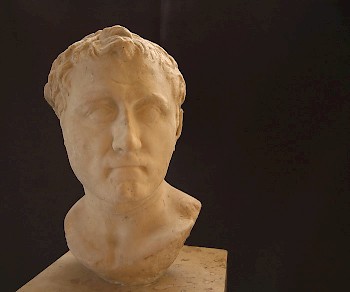
This was the end of the war. There were still many fugitives in the mountains of Bruttium, and they organized themselves into four groups. This is the ultimate tribute to Spartacus' genius as an organizer: even after his death, his men were able to continue a disciplined struggle. However, they were eventually defeated, some by Pompey, others by Crassus.
Six thousand gladiators were captured alive. They were crucified along the Via Appia, the road between Rome and Capua. For years, travelers were forced to see the crosses: every thirty, forty meters, they saw how a body of a former slaves was rotting away, a prey for the vultures and dogs.
Afterlife
All ancient sources show Spartacus as a criminal and bandit, even worse than the other arch-enemy of Rome, Hannibal. (The exception is Varro, who states that Spartacus was innocently condemned to the arena.) This black image remained unchallenged in the Middle Ages and Renaissance.
However, in 1760, the French tragedy Spartacus by Bernard-Joseph Saurin presented him as a noble hero. This play, which was based on the story of Plutarch, is the origin of the modern, positive image of the slave leader. Karl Marx, after reading Appian, was equally impressed by the Thracian gladiator. Since then, Spartacus has often been used as a symbol of emancipation: of the poor, of repressed nationalities (e.g., Bulgaria), and of the working class - especially in the Communist countries during the Cold War. After Kirk Douglas' heroic nudity in Stanley Kubrick's sentimental movie Spartacus (1960), the gladiator became a symbol of the emancipation of male homosexuals.